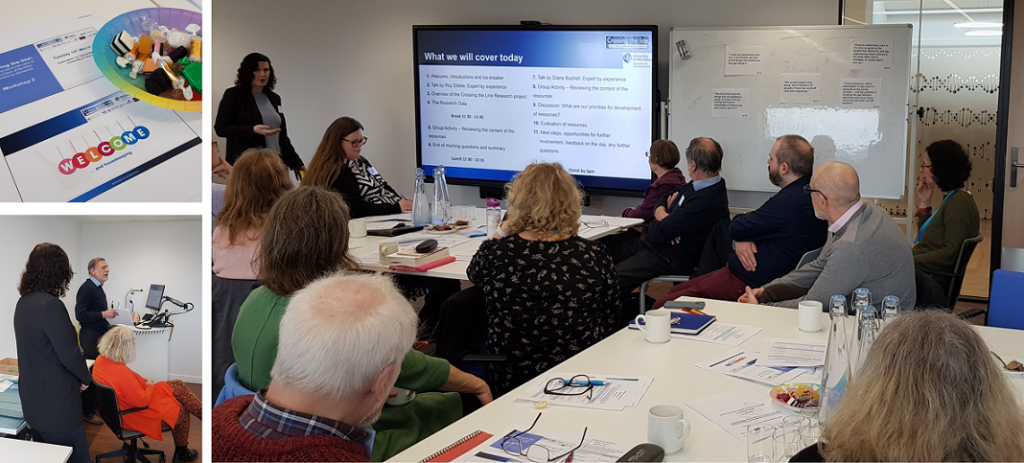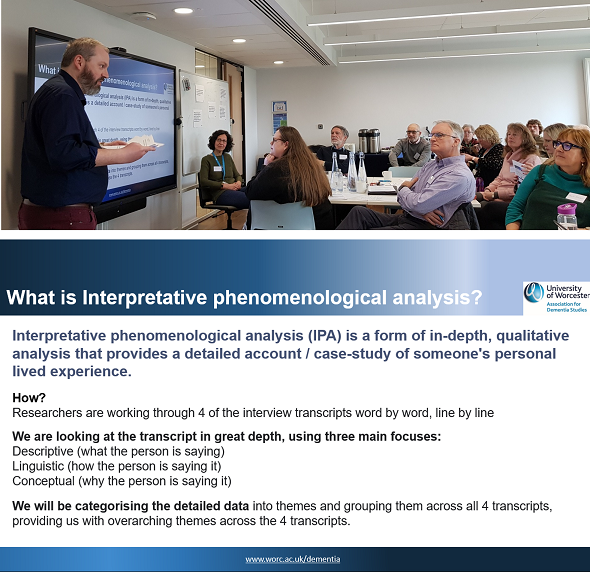Last week the second in-person workshop took place as part of the Crossing the Line project which is looking to develop resources to support family carers providing personal care to a person living with dementia. The first workshop in January was such a great day with lots of input and insight, and the second workshop did not disappoint either.
Professor Tracey Williamson welcomed everyone to the event before inviting Roy Dibble, one of our experts by experience, to talk to the group. Roy set the scene for the day by sharing his story of caring for his wife Ros who is living with Posterior Cortical Atrophy. It was enlightening to hear some of the challenges Roy faced, not just in terms of providing personal care, but also changing dynamics within his relationship with Ros and taking on other responsibilities within the home. We also had a lovely chance to hear about Ros and some of the amazing things she achieved in her life, reminding us of the person behind the dementia.

Following Roy, Dr Shirley Evans provided a brief overview of the Crossing the Line project as a reminder for people who weren’t able to attend the previous workshop, before handing over to Thomas Morton to provide more information about some of the analysis that’s been carried out so far on survey and interview data. As the quantitative survey results had been covered to some extent in the first workshop Thomas just highlighted a few headline results, such as receiving responses from right across the UK.
Thomas also talked about Interpretative Phenomenological Analysis (IPA, see the image below), a type of in-depth analysis being used with four interview transcripts and thematic analysis which is being applied across all 28 transcripts. This led nicely into a group activity (it’s almost like we planned it!!) looking at the emerging themes. Each table was encouraged to comment on whether the themes – and the language used – made sense and resonated with their experiences, and to suggest how to describe each theme.

After a brief break, Emeritus Professor Dawn Brooker MBE ran a session focusing on the ‘Really Handy Carers Handbook’ which is currently being developed. The handbook has come a long way since the last workshop, mainly thanks to input from our workshop attendees who have been involved in writing some of the content. It is anticipated that the handbook will have three main sections:
- Setting the scene
- A-Z of general issues that impact on personal care in dementia
- Specific areas of personal care
A group activity looked at some of the existing content from sections 2 and 3 to get feedback on it, help rewrite things that don’t make sense, and identify areas that are missing. It also provided and opportunity to invite volunteers to write any remaining sections.
Kicking off the afternoon session was one of our PhD students Diane Bushell who shared her experiences of providing personal care for her mum, with a particular focus on various aspects of going to the loo. Di offered lots of great insight and useful suggestions and strategies about what helped her and her mum, and got everyone thinking about some of the challenges people encounter.

This fed into a group activity where one of the handbook topics being considered from section 3 was help with toilet activities. There were lots of good discussions going on and some great feedback to help us further develop the handbook with real, practical advice.
The workshop concluded with Tracey looking at our priorities for developing resources before the end of the project, getting the group to vote on what format(s) we should focus on initially (leaflets, video clips and web pages were the winners). We also had some great offers to help us test those resources and get feedback on them before they are finalised.

Thank you to everyone for being part of the workshop and sharing your thoughts and experiences with us so generously. There’s one more face to face workshop planned for May, and we’ve also held two shorter online sessions for people who were unable to attend in person.
Full steam ahead until the end of the project!
Connect with ADS on twitter @DementiaStudies and on Facebook @adsuow
We’re also on Instagram, Threads and LinkedIn so have a look and find us there too.







